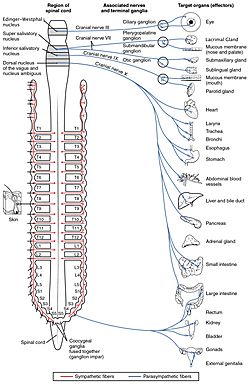Parasympathetic nervous system facts for kids
Quick facts for kids Parasympathetic nervous system |
|
|---|---|
 |
|
| Nerves of the autonomic nervous system. Parasympathetic nerves, and the body parts they affect, are shown in blue. |
The parasympathetic nervous system (PNS or PSNS) is a super important part of your body's control center. This control center is called the autonomic nervous system. Think of the PNS as your body's "chill out" system. It does the opposite of the sympathetic nervous system, which is your "fight or flight" system.
When you are in danger, your sympathetic nervous system kicks in. It gets you ready to run or fight. But once the danger is gone, the parasympathetic nervous system takes over. It helps your body "rest and digest" food. It also helps you "feed and breed." These two systems work together to keep your body balanced and healthy.
Contents
How the PNS Affects Your Body
The parasympathetic nervous system has many different effects. It helps control almost every part of your body.
Heart and Lungs
- Heart: Your heart relaxes and beats slower. This makes your heart rate and blood pressure go down.
- Lungs: Your breathing slows down. The tubes that bring air to your lungs, called bronchi, also get a bit narrower.
Eyes and Digestion
- Eyes: The black centers of your eyes, called pupils, get smaller.
- Digestive System: More blood goes to your stomach and intestines. Your stomach and intestines also work faster. This helps your body digest the food you have eaten.
Blood Vessels and Skin
- Blood Vessels: The blood vessels in parts of your body far from your heart, lungs, and brain get wider. This is called vasodilation. It helps lower your blood pressure. It also makes your skin feel warmer.
Balancing Act
The parasympathetic nervous system always needs to balance with the sympathetic nervous system. If only the parasympathetic system was working, your heart rate and breathing would keep getting lower. This could be very dangerous.
Luckily, your brain is smart! It knows when the parasympathetic system's effects are getting too strong. For example, if you are breathing too slowly or your heart rate is too low, your brain reacts. It makes the sympathetic nervous system kick in. This system has opposite effects. It will make you breathe faster and raise your heart rate. These two systems must constantly balance each other for you to stay healthy.
How the PNS is Controlled
The parasympathetic nervous system is mostly controlled by the vagus nerve. This is a very important nerve. It starts in your brain and goes all the way down to the bottom of your spinal cord.
The vagus nerve sends out tiny chemical messages. These messages are called neurotransmitters. The main one is called acetylcholine. This chemical causes all the changes you see in different parts of your body.
Related Pages
See also
 In Spanish: Sistema nervioso parasimpático para niños
In Spanish: Sistema nervioso parasimpático para niños
 | Stephanie Wilson |
 | Charles Bolden |
 | Ronald McNair |
 | Frederick D. Gregory |

